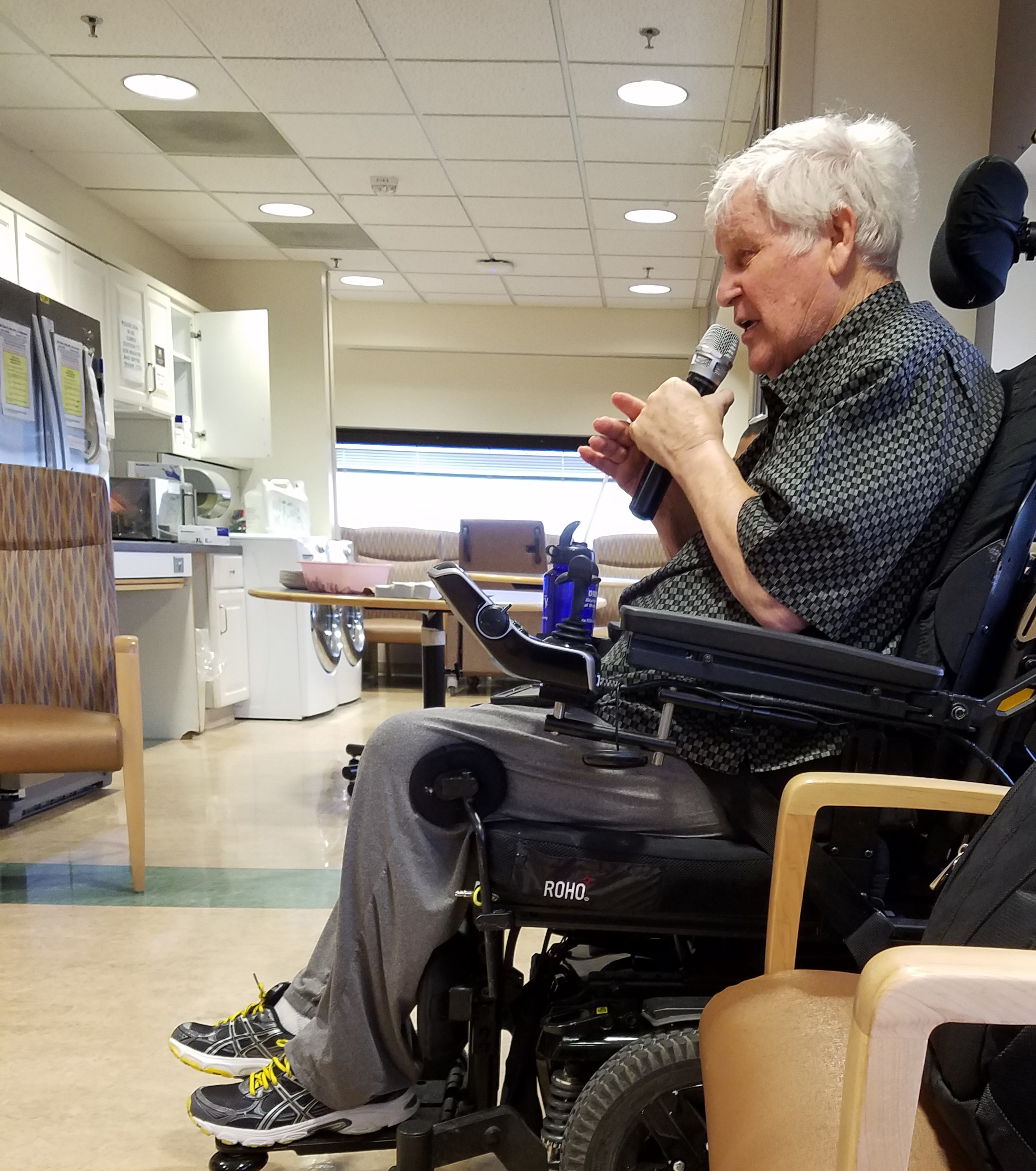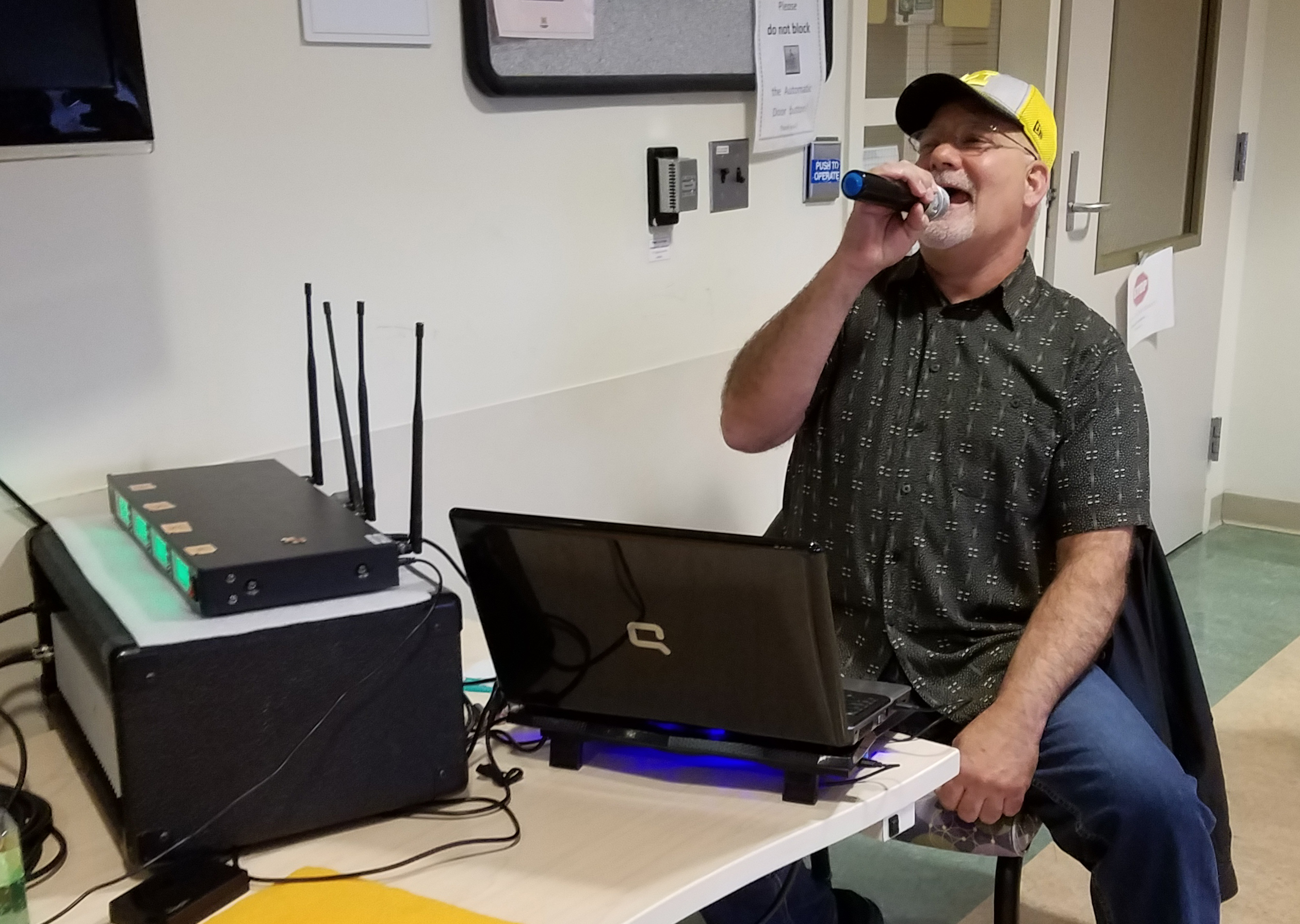
The story of karaoke at the University of Michigan Hospital begins twenty years ago with a hunting accident in Mexico. Carroll Knight, president of Knight Enterprises, had an accident with his gun that took off the ends of three of his fingers and a thumb. After surgery in Houston, Knight returned to Michigan wrapped up in bandages and was having dinner with a group of business associates at a restaurant that had karaoke. Looking to get himself back into good spirits after the accident, he jokingly encouraged his associates to write down their names and the song they would sing.
But little did he know that a woman who had worked with him for 38 years took the joke even further by bribing the karaoke host to call Knight to the stage next. The version of his chosen song, "Blue Moon", the host had was a doo-wop version which didn't work for Knight. Pressured by his associates to stay on the stage and pick a new song, he chose "My Funny Valentine."
"They applauded and I've been hooked ever since."
Before that evening, Knight's musical experience had been limited to singing in the shower and at church and a performance on Arthur Godfrey's show during a college glee club trip to New York City. After, though, he continued haunting karaoke establishments expanding his repertoire to over 500 songs. The trick to mastering karaoke, according to Knight, is to do it enough that the singer feels comfortable and to find a song in the right vocal range. Ignoring the audience is also key. Knight is adamant that karaoke is for the enjoyment of the singer, not the audience.
"They're not paying to hear you sing."

When a collision with an air bag during a car accident put him in the hospital again, this time a two-month stay with the Department of Physical Medicine & Rehabilitation at University Hospital for a spinal cord injury, he wanted to share the healing power he saw in karaoke. He enlisted Jerry Arnett, a karaoke host he'd befriended, and after the first time, a hospital staffer mentioned that a patient who had been "down in the dumps," according to Knight, had overheard the performance and enjoyed it. Several more karaoke evenings followed and he says other staffers told him they saw morale improving. Then he started bringing in pizza.
Through it all, the patient stories are the ones that stick with him the most. He tells of a young woman with significant injuries who came to listen with her husband and her new baby. Knight says she didn’t take the microphone to sing, but she sang along from her seat. And when her husband took the mic, she took the baby and rocked it along with the music.
"That's priceless," Knight said.
Along with Carroll and Jerry, a rehabilitation technician named Matt Mullen completes the karaoke triumvirate on the sixth floor. Mullen, who says he is known around the physical therapy gym as a "music nerd," was recruited by his supervisor to help staff the karaoke nights and he quickly ingrained himself with the patients.
"Music is how I relate to people and to the world," he said. "Music is such a life force for getting people through hard times."
One of Mullen's favorite patient memories is a patient liked to sing "Tomorrow," from the musical Annie, to himself in his bed. Mullen and the staff encouraged the patient to come down and sing it for the rest of the group and that's when Mullen says he saw the patient's personality come alive.
"It was his personal mantra," Mullen says.
He also fondly remembers the time they sang "Grandma Got Run Over by a Reindeer" in the middle of July to help a patient who loved Christmas music.
All of these examples speak to one of the biggest reasons Knight values karaoke over other forms of musical therapy is the performance aspect. He says he likes to be the one singing and likes to see others around him enjoying it. Supporting PM&R patients through karaoke comes with other intangible benefits as well. Knight says valets and staffers greet him by name when he parks and when he makes his way through the halls of the hospital each Thursday to the 6th floor recreation room where he and Arnett hold court for several hours.
"It's all because of the singing."

Mullen agrees and says that Knight's involvement, both as a support and singer is key to it all working as well as it has.
"He helps create an atmosphere where everyone feels welcome."
For more information about the Department of Physical Medicine & Rehabilitation's Acute Inpatient Unit, visit their website on UofMhealth.org
For more information about supporting patient programs within the department, contact Matt Douponce at (734)763-5392 or [email protected]


